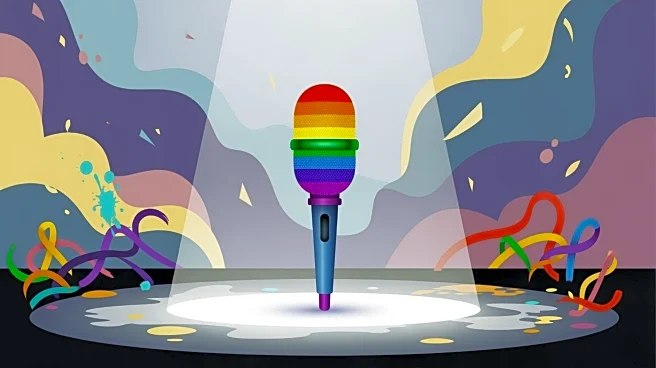What's Happening?
Hannah Gadsby, an Australian comedian, has gained international recognition for her Netflix special 'Nanette,' which challenges traditional comedy norms by addressing serious issues such as sexism, homophobia, trauma, and discrimination. Born in Tasmania,
where homosexuality was illegal until 1997, Gadsby has faced personal struggles with identity and mental health. Her upbringing in a homophobic environment led to internalized shame, which she later confronted through her comedy. 'Nanette' marks a departure from self-deprecating humor, as Gadsby refuses to belittle herself for laughs, advocating instead for a more honest and direct discourse. Her work has sparked debate about the role of comedy in social commentary, with some critics arguing that 'Nanette' is not a traditional comedy show due to its engagement with sensitive topics.
Why It's Important?
Gadsby's approach in 'Nanette' is significant as it challenges the boundaries of comedy, pushing for a more inclusive and reflective form of entertainment that addresses societal issues. Her refusal to use self-deprecating humor is a powerful statement against the marginalization of minority voices in comedy. By highlighting issues of gender-based violence and discrimination, Gadsby contributes to broader conversations about equality and representation in the entertainment industry. Her work encourages audiences to reconsider the role of humor in discussing serious topics, potentially influencing other comedians and creators to adopt similar approaches. This shift could lead to more diverse narratives and greater acceptance of varied identities in mainstream media.
What's Next?
Following the success of 'Nanette,' Gadsby is touring with her new show 'Douglas,' which continues to explore themes of identity and neurodiversity. Scheduled for release on Netflix in 2020, 'Douglas' is expected to further Gadsby's impact on comedy and social discourse. As she navigates her career post-'Nanette,' Gadsby remains committed to advocating for LGBTQ+ rights and challenging societal norms. Her work may inspire other comedians to incorporate activism into their performances, potentially leading to a broader cultural shift in how comedy is perceived and utilized as a tool for change.
Beyond the Headlines
Gadsby's work raises important questions about the ethical responsibilities of comedians in addressing sensitive topics. Her approach challenges the notion that comedy must always be light-hearted, suggesting instead that it can serve as a platform for meaningful dialogue and social change. This perspective may influence the future of comedy, encouraging performers to engage with complex issues and audiences to embrace more nuanced forms of entertainment. Additionally, Gadsby's advocacy for neurodiversity and her personal experiences with autism highlight the need for greater representation and understanding of diverse mental health experiences in media.

















